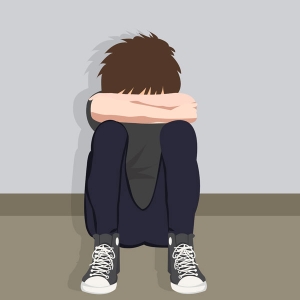Are
my sexual behaviors really that bad?
Just like any
addiction, sexual
addiction can occur on a continuum of severity. On one end of the
spectrum is the person who has caused physical harm to themselves or
others or who has gotten into legal trouble for their sexual
behaviors. On the other end is the person who hides their behaviors
and feels shame about them but has not really suffered any external
or visible consequences as a result.
While a person
who has suffered more consequences might be more likely to admit they
have a problem, it is not necessary to let things get that far before
seeking help. No one thinks that they will ever go “that far,” or
that their addiction will get out of control. Almost everyone feels
somewhat surprised when they find themselves neck deep in dire
consequences from their sexual behaviors, having believed that they
would somehow avoid the inevitable. It is possible, and wise to stop
before it gets to that point.
How
do I know if I have an addiction?
There are three
common characteristics of addiction:
obsession, compulsion, and continuation despite adverse consequences.
Obsession refers
to the intrusive and sometimes never-ending thoughts about the
behavior. Obsession could mean that a person constantly thinks about
the behavior; but, more often, it simply means the obsessive thoughts
come at times that are inconvenient, inappropriate, or distracting
and that it is difficult to stop the thoughts when they do arrive.
The thoughts can be about the actual sexual behavior or about some
aspect of the behavior. People might obsess about a person that they
act out with, a place where they have acted out, (a hotel, car, or
certain club) a plan to act out, or something that they use in their
acting out (website, flowers, secret phone) or even about plans to
enable their acting out (checking funds, making reservations,
thinking of excuses of why they will be home late).
Compulsion refers
to the engagement in the behavior despite efforts to not engage. A
person who makes sincere promises that they will discontinue the
behavior, then finds excuses to continue doing it in spite of those
promises is typically acting on a compulsion. Another common example
of a compulsive behavior is when a person knows they have made a
prior commitment to be somewhere, like at a family function, but they
feel they must act out sexually and they do, making them late for the
function or making them miss it entirely. Ultimately, compulsive
behaviors will lead to adverse consequences; however, adverse
consequences alone do not necessarily mean that an addiction is
present. Some people engage in a behavior, suffer an undesirable
consequence, and then never engage in that behavior again. But, when
someone continues the behavior after suffering consequences, it
indicates a more severe problem.
Imagine a person
who compulsively views pornography. Their children find the digital
files, and their spouse becomes very angry and insists that all the
pornographic images be deleted from the computers in their home.
Instead, the person downloads the images onto a flash drive, labels
it “Architecture Plans,” and continues to watch it, hoping the
children will be deterred by the label.
This is a
continuation of
behavior despite adverse external consequences
and puts this person at risk for further undesirable outcomes.
Internal consequences are just as important as external consequences
but are often less obvious than external ones. Internal consequences
include, but are not limited to, feelings of intense shame, intense
self-hatred, isolation, and secrecy. Adverse external and/or internal
consequences are usually what motivate the person to seek help.
Do
I need help?
Adverse
consequences have a unique way of offering a moment of clarity. A
person may be willing to admit to themselves that they need help
after suffering a consequence. Or they may be willing to get help,
even if they are not sure they need it because, at a minimum, they
want to avoid further painful consequences. There are also times when
a person might seek help just to appease a loved one, their employer,
or the courts.
Regardless of the
reason, if the person receiving help is open to looking at the
potential causes of their behavior and its consequences, they will
reap the benefits of treatment. If you have suffered consequences for
your sexual behaviors, particularly repeated consequences, the time
to seek help is now.
Still
have doubts?
When a person
experiences consequences, it usually leads to a bit of an emotional
crisis. There is a strong desire for the pain to stop. When the pain
of consequences leads a person to make the wise decision to seek
help, denial can sometimes step in and offer a second opinion. After
the crisis of the consequence fades, decisions to seek help are
occasionally rescinded. That call for help might seem like a “rash
decision” or an “overreaction.” Do not allow yourself to fall
back into the denial. Get the help you need. Your future self will
thank you.
What
are my options for help?
Rio Retreat at
The Meadows offers two different 5-day workshops, one exclusively for
men and one exclusively for women, that helps people begin to deal
with their sexual compulsivity or sexual addiction.
The Men’s
Sexual Compulsivity Workshop helps men to broaden participants’
views about sexuality, learn how to have healthy sexual experiences,
maintain positive relationships, and avoid harmful patterns of the
past.
The Journey
of a Woman’s Heart: Finding True Intimacy Workshop is for women
who want to explore unhealthy sexual patterns and behaviors that
deeply impact their ability to develop real emotional connections.
Methods for enhancing self-esteem from within, rather than seeking
validation from outside sources are explored
The Meadows also
offers inpatient treatment programs for sexual addiction and
compulsivity. Gentle
Path at The Meadows is exclusively for men and Willow House at
The Meadows is exclusively for women. All of our programs are firmly
based in the work of Dr.
Patrick Carnes and his 30-task model. Please call our Intake
Department at 866-986-3225 to begin the healing process and find out
which program is best for you.



